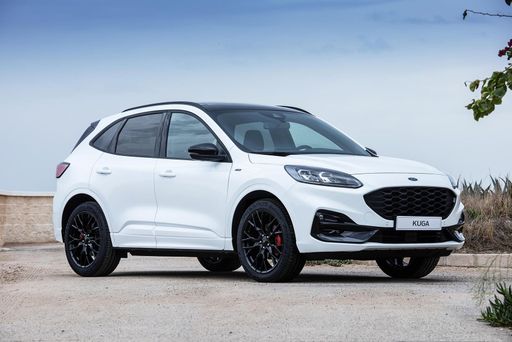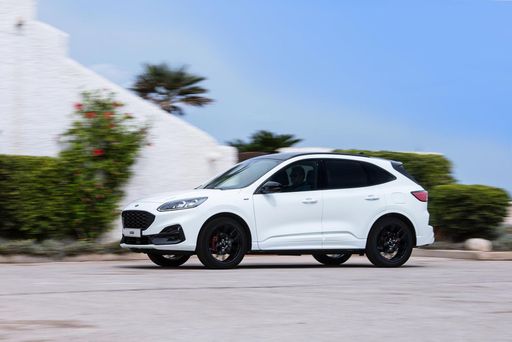Ford Kuga vs VW Tiguan - Differences and prices compared
Compare performance (243 HP vs 272 HP), boot space and price (34200 £ vs 33300 £ ) at a glance. Find out which car is the better choice for you – Ford Kuga or VW Tiguan?
Costs and Efficiency:
When it comes to price and running costs, the biggest differences usually appear. This is often where you see which car fits your budget better in the long run.
VW Tiguan has a slight advantage in terms of price – it starts at 33300 £ , while the Ford Kuga costs 34200 £ . That’s a price difference of around 942 £.
Fuel consumption also shows a difference: VW Tiguan manages with 1.40 L and is therefore clearly more efficient than the Ford Kuga with 2.80 L. The difference is about 1.40 L per 100 km.
As for electric range, the VW Tiguan performs clearly better – achieving up to 126 km, about 58 km more than the Ford Kuga.
Engine and Performance:
Power, torque and acceleration are the classic benchmarks for car enthusiasts – and here, some clear differences start to show.
When it comes to engine power, the VW Tiguan has a to a small extent edge – offering 272 HP compared to 243 HP. That’s roughly 29 HP more horsepower.
In acceleration from 0 to 100 km/h, the VW Tiguan is distinct quicker – completing the sprint in 5.90 s, while the Ford Kuga takes 7.30 s. That’s about 1.40 s faster.
In terms of top speed, the VW Tiguan performs a bit better – reaching 242 km/h, while the Ford Kuga tops out at 200 km/h. The difference is around 42 km/h.
There’s also a difference in torque: VW Tiguan pulls noticeable stronger with 400 Nm compared to 240 Nm. That’s about 160 Nm difference.
Space and Everyday Use:
Beyond pure performance, interior space and usability matter most in daily life. This is where you see which car is more practical and versatile.
Both vehicles offer seating for 5 people.
In curb weight, Ford Kuga is barely noticeable lighter – 1526 kg compared to 1599 kg. The difference is around 73 kg.
In terms of boot space, the VW Tiguan offers noticeable more room – 652 L compared to 412 L. That’s a difference of about 240 L.
In maximum load capacity, the VW Tiguan performs slight better – up to 1650 L, which is about 116 L more than the Ford Kuga.
When it comes to payload, Ford Kuga barely noticeable takes the win – 550 kg compared to 533 kg. That’s a difference of about 17 kg.
Who wins the race?
The VW Tiguan proves to be leaves the rival little chance and therefore becomes our DriveDuel Champion!
VW Tiguan is the better all-rounder in this comparison.

VW Tiguan
Costs and Consumption
View detailed analysis
Engine and Performance
View detailed analysis
Dimensions and Body
View detailed analysis
Ford Kuga
The Kuga is Ford’s adaptable family SUV that blends usable space with a surprisingly lively driving character, making daily commutes and weekend escapes equally enjoyable. With smart interior packaging, an easy-to-use infotainment setup and composed road manners, it’s a sensible choice for buyers who want a bit of fun without the fuss.
details


VW Tiguan
The VW Tiguan blends sensible family practicality with a dash of German polish, delivering a calm, reassuring ride and a cabin that never feels like an afterthought. For buyers who want an SUV that’s easy to live with yet still nicely dressed, the Tiguan is the grown‑up choice that keeps a cheeky wink in reserve.
details





Costs and Consumption |
|
|---|---|
|
Price
34200 - 46300 £
|
Price
33300 - 51900 £
|
|
Consumption L/100km
2.8 - 6.8 L
|
Consumption L/100km
1.4 - 8.4 L
|
|
Consumption kWh/100km
-
|
Consumption kWh/100km
-
|
|
Electric Range
68 km
|
Electric Range
118 - 126 km
|
|
Battery Capacity
1.1 - 14.4 kWh
|
Battery Capacity
19.70 kWh
|
|
co2
55 - 154 g/km
|
co2
32 - 190 g/km
|
|
Fuel tank capacity
42 - 54 L
|
Fuel tank capacity
45 - 58 L
|
Dimensions and Body |
|
|---|---|
|
Body Type
SUV
|
Body Type
SUV
|
|
Seats
5
|
Seats
5
|
|
Doors
5
|
Doors
5
|
|
Curb weight
1526 - 1859 kg
|
Curb weight
1599 - 1890 kg
|
|
Trunk capacity
412 L
|
Trunk capacity
490 - 652 L
|
|
Length
4604 - 4645 mm
|
Length
4539 mm
|
|
Width
1882 mm
|
Width
1842 - 1859 mm
|
|
Height
1673 - 1681 mm
|
Height
1656 - 1658 mm
|
|
Max trunk capacity
1534 L
|
Max trunk capacity
1486 - 1650 L
|
|
Payload
541 - 550 kg
|
Payload
460 - 533 kg
|
Engine and Performance |
|
|---|---|
|
Engine Type
Petrol, Full Hybrid, Plugin Hybrid
|
Engine Type
Petrol, Petrol MHEV, Diesel, Plugin Hybrid
|
|
Transmission
Manuel, Automatic
|
Transmission
Automatic
|
|
Transmission Detail
Manual Gearbox, CVT, Automatic Gearbox
|
Transmission Detail
Dual-Clutch Automatic
|
|
Drive Type
Front-Wheel Drive, All-Wheel Drive
|
Drive Type
All-Wheel Drive, Front-Wheel Drive
|
|
Power HP
150 - 243 HP
|
Power HP
130 - 272 HP
|
|
Acceleration 0-100km/h
7.3 - 9.9 s
|
Acceleration 0-100km/h
5.9 - 10.6 s
|
|
Max Speed
195 - 200 km/h
|
Max Speed
210 - 242 km/h
|
|
Torque
240 Nm
|
Torque
220 - 400 Nm
|
|
Number of Cylinders
3 - 4
|
Number of Cylinders
4
|
|
Power kW
111 - 178 kW
|
Power kW
96 - 200 kW
|
|
Engine capacity
1496 - 2488 cm3
|
Engine capacity
1498 - 1984 cm3
|
General |
|
|---|---|
|
Model Year
2025
|
Model Year
2024 - 2025
|
|
CO2 Efficiency Class
E, D, B
|
CO2 Efficiency Class
G, D, E, F, B
|
|
Brand
Ford
|
Brand
VW
|
What drivetrain options does the Ford Kuga have?
The Ford Kuga is available as Front-Wheel Drive or All-Wheel Drive.




